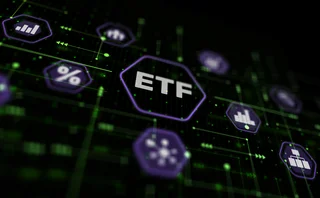Waters Wrap: A glimpse of 2024 through the looking glass of 2023
Anthony examines some of the biggest stories from the past year to preview what might be ahead.

Over the last few months of 2023, I conducted a series of interviews with various CTOs, CIOs, and heads of technology at some of the largest banks and asset managers in the world. These on-background conversations aimed to get an idea of where they’re directing their budgets and people this year and beyond. Later this month, we’ll start publishing a series of stories based on those interviews.
The point of this column, though, is to take a look back at what I believe are the best stories published on WatersTechnology last year. A bit of a cop-out, I know, but I think this collection paints a picture of where the industry is heading. Also, some of these articles flew under the radar—if you’re reading this, that means you’re a subscriber (or someone is stealing from me!) and I think you’ll get the most value out of that investment by giving these another look.
Finally, I massively appreciate the fact that people are spending a lot of money to read our tech and data coverage. I hope that we deliver high-value journalism that both informs and helps readers to do their jobs better—or at least think about this rapidly changing landscape in a different way. If there’s anything you think that we’re not covering well or should be digging deeper into, please let me know—I promise that your feedback will not fall on deaf ears (or, since it’s email, fall on blind eyes): anthony.malakian@infopro-digital.com
The Best from WatersTechnology in 2023
- What is Aladdin Trader? BlackRock’s fixed-income tool still a mystery - WatersTechnology.com
BlackRock Aladdin has a new tool dubbed Aladdin Trader. Sources we spoke to say it has functionality that acts like an execution management system, but that it isn’t, by definition, an EMS. While we know it exists, BlackRock is being quiet as to the specific functionality that Aladdin Trader offers and what the tool might mean for its existing partnerships with EMS providers, FlexTrade and FactSet (through Portware).
Analysis: First, this story took us a year and a half to pull together…so there’s a lot of insight from a swath of industry experts in that link. Also, there are two fascinating storylines to the release of Aladdin Trader, in my opinion. The first is it shows that buy-side traders want more execution tools, and they want those tools made available in one place, rather than having to jump around between systems.
The second intriguing piece of the story is the potential regulatory implications that come with releasing a true fixed-income EMS. The European Securities and Markets Authority and the UK’s Financial Conduct Authority each published their final guidance on trading venue parameters this year, which could ensnare all sorts of vendors, but certainly EMS providers. Similarly, under chairman Gary Gensler, the US Securities and Exchange Commission also has its sights set on the EMS community (among numerous others).
I imagine that soon, BlackRock will provide more detail into Aladdin Trader (just maybe not initially with us), but no matter what, keeping an eye on the evolution of fixed income and the tools that power the asset class will be a major focal point for our readers. As will the ambitious regulatory proposals in Europe and the US.
- BloombergGPT: Terminal giant enters the LLM race - WatersTechnology.com
There’s no question that 2023 was the year of large language models and generative AI. For the capital markets, the first large company to announce a major product enhancement related to LLMs was Bloomberg via its ubiquitous Terminal. While not a generative tool, the project aims to provide more depth to things like sentiment analysis, named-entity recognition (NER), news classification, charting, and the Terminal’s question-answering capabilities.
Analysis: Say what you want about Bloomberg, but the data and tech giant didn’t need to slap “GPT” on a product—they’ve got the customers and they’ve got the Terminal…being first on the hype train wasn’t a necessity. And LLMs are not new, but the release of GPT-3.5 (and subsequent releases of these generative pre-trained models) are new…hence why the topic is all the rage since the unveiling of ChatGPT at the end of 2022. But Bloomberg—and, subsequently, the likes of S&P Global, FactSet, and Broadridge, among several other vendors and exchanges—exploring this new vista of analytics shows that this is evolution, not a fad that will come and go. (I’m not sold on the term “chatbot” being a fad, but give me more time to think about it.)
- What’s the market for Ion Markets? - WatersTechnology.com
In August, we published a story speculating on the idea of Ion Markets, the aggressively acquisitive division of Ion Investment Group, being itself acquired. For the article, we spoke with more than a dozen industry participants, eight of whom repeated the rumor that Ion Markets, the largest and most expensive-to-operate jewel in Ion Group’s crown, was looking for one or more buyers.
Analysis: Now, obviously, Ion Markets has not been sold…yet. Maybe it was simply a rumor. Maybe there were talks that fell apart. Maybe a deal this complex will take a considerable amount of time to complete. Time will tell.
As has been documented in the past, Ion is extremely acquisitive, and at times, to the detriment of the acquired vendor. So it’s interesting if that company is in the other shoe. More importantly, though, if Ion were to be sold—or if pieces were shopped individually—I think it would have a lot to do with the complexities and evolution of the fixed-income market. Users increasingly want to see integration and automation…things that haven’t been calling cards for Ion after it acquires companies, and it doesn’t always play nice with others. (Also, see the blurb above about Aladdin Trader and changes in fixed income.) But that’s what makes this rumor so interesting (beyond just the potential scale of it)—it shows just how rapidly fixed income is evolving.
- Who is at fault for Goldman Sachs’s $5.5 million fine? - WatersTechnology.com
In ‘unusual’ move, Virtu fights $25m SEC fine for data safeguarding breach - WatersTechnology.com
Speaking of regulation, this past August, the Commodity Futures Trading Commission (CFTC) hit Goldman Sachs with a $5.5 million fine. The regulator charged that the bank had both violated a cease-and-desist provision of a prior order and committed record-keeping violations where the firm did not properly record and retain specific audio files. The offenses occurred at the beginning of the pandemic. While fines happen, what was interesting is it appears that a CFTC commissioner outed the two Goldman Sachs vendors that were at the heart of the recording and recording-keeping violations.
The second story examines how the SEC sued market-maker Virtu Financial over data safeguarding concerns. The SEC asserts that Virtu operated two businesses that were supposed to be walled off from each other: a proprietary trading business, through which Virtu traded for its own benefit; and an order execution service for large institutional customers, on which Virtu executed orders for clients. Unlike Goldman, Virtu—and its firebrand CEO, Doug Cifu—are taking the unusual route of fighting the regulator, rather than paying out the $25 million fine levied by the SEC.
Analysis: The reason why I find this story so interesting is that Goldman got hit with a big fine because two of its vendors suffered major operational failures. Did it matter that the alleged offenses occurred at the height of the pandemic? Nope. Did it matter that it wasn’t Goldman’s, but two other vendors’ tech that fell down? Nuh-uh. Did it matter that there was some ambiguity around the regulator’s messaging at the time of the violations (and that the CFTC’s own commissioners disagree on the fine)? No siree, Bob. That’ll be 5.5 mil, please.
As for Virtu, did it matter that Virtu fixed the issue internally, and then disclosed the situation to the regulator ahead of an SEC exam? Nah. And did it matter that the firm cooperated with the regulator and that there is no evidence that insider trading had taken place? Don’t be silly. That’ll be 25 mil, please, and thank you.
Three things jump out at me: One, when tech and processes fail, the end user is on the hook, both reputationally and monetarily. Sometimes that’s completely fair; other times, I think some (including myself) might argue the regulators are trying to score political points. Second, there’s an election coming up here in America, and, like it or not, the CFTC and SEC are political. If there’s a changing of the guard in the White House, will that change how aggressive these two regulatory bodies are toward trading firms? (Hint: yes. But I’ll leave that to the voters to deem if that’s for better or worse.)
And finally, I can’t help but think that as regulators get more aggressive with the doling out of fines, this will inform how they look to address the Big Tech providers, which are rapidly gaining in influence across the capital markets. It’s worth noting that in the US and Europe, the calls for greater oversight are growing louder.
- Cloud trumps blockchain: DTCC’s TIW goes live, and no one’s choosing the DLT option - WatersTechnology.com
In October 2022, the Depository Trust & Clearing Corporation’s long-anticipated re-platforming of its Trade Information Warehouse project went live. The service has been delivered on cloud technology with support for distributed-ledger technology capabilities at the access layer. Three sources with knowledge of the re-platforming told us that as of early March 2023, every single client connected to the cloud-based TIW—thus, none had connected via DLT.
Analysis: In March of 2022, we published an article titled “Where have all the blockchain startups gone?”. In November of 2022, we examined the Australian Securities Exchange’s (ASX’s) failed DLT replacement project for its equities settlement platform, CHESS. Earlier in this column, I referred to large language models and generative AI as being evolutionary—they’re extensions of progress made in the fields of machine learning, natural language processing, and mathematical analytics, among other things. Outside of digital assets and cryptocurrencies, blockchain/DLT has proven to be a hammer looking for a nail (at least in the capital markets), and that hammer should be put back into the box.
- Antitrust complaint against Cusip can go forward, SDNY judge rules - WatersTechnology.com
After much anticipation, federal judge Katherine Polk Failla in the Southern District of New York allowed Dinosaur Financial Group, Hildene Capital Management, and Swiss Life Investment Management to continue with their joint complaint that Cusip Global Services (CGS) and its affiliates (including S&P Global and FactSet) potentially violated Section 2 of the Sherman Antitrust Act, the federal law passed in 1890 that outlaws monopolistic behavior.
Analysis: While there is still likely a long way to go for this case, the fact that it was allowed to move forward is a big deal. The discussion over the cost of data is always contentious. The distribution of Cusips has been a “cash cow” for its owners for decades, much to the chagrin of trading firms in North America. Well, now both sides of the debate will have their say in court.
It might take several years before this case sees its completion, but—hypothetically—if the ruling goes against CGS and its affiliates, the domino effect could be quite impressive, say nothing about what that would mean for CGS’s new owner, FactSet, and its old one, S&P Global. Also, as I wrote previously, I can’t help but think that the DTCC might get dragged into this fight at some point…but that’s just me speculating based on conversations with various people watching the case unfold.
While reference data is not as sexy as generative AI, for those involved, the past 12 months—and the coming 12 months—have been (will be) wild for the reference data community.
- A rough race begins: Industry faces uphill transition to T+1 settlement - WatersTechnology.com
FRTB forces banks to rethink entire data management infrastructure - WatersTechnology.com
May of this year will see America, Canada, and Mexico move to T+1 settlement, after only recently moving to T+2. And on January 1, 2025, in theory, the Fundamental Review of the Trading Book (FRTB) will finally come into effect.
Analysis: The biggest story in 2024 for the capital markets could very well be North America’s move to T+1 settlement in 2024. Firms in Europe are watching how the Americas handle the move. So, too, are firms in Asia. FX folks are trying to figure T+1 out before the deadline hits. And isn’t there always a DLT/digital assets angle to be found when discussing this particular subject? My guess is that if we do one of those word cloud bubbles at the end of this year, T+1 will be up there with genAI/LLM, market data fees, and…well…cloud.
As for FRTB, I recently had a chief operations officer at a tier-1 US bank ask me, “Can you show me one bank that is doing [their prep for] FRTB well right now? Seriously, do you know anyone? … Everyone I talk to is hoping for a delay.”
Maybe to put a finer point on it, but if I write this exact column at the start of January 2025, my guess is that T+1 and FRTB will feature prominently…or else then maybe I didn’t do a good enough job of directing resources.
- Questions surround buy-side tech consortium Hub - WatersTechnology.com
On January 7, 2021, a powerhouse of six large companies—Pimco, Man Group, IHS Markit, State Street, Microsoft and McKinsey—collectively announced they were forming a new company, called Hub. The aim of the collective was to “reimagine” asset management firms’ operating model with a cloud-based platform. Two and a half years later, the company has relatively little to show for it—at least, publicly. Hub CEO Paul Taylor says the consortium is working toward building an optimized operations platform for the investment management industry. Other industry sources wonder if the project will ever truly come to fruition.
Analysis: If 2023 was the year of LLMs and genAI, 2022—and probably 2021, 2020 and 2019—were the years of cloud. Exchanges around the globe have signed high-profile partnerships with the likes of Amazon, Google, and Microsoft to move their infrastructures into the cloud, including—potentially—matching engines and multicasting. And similarly, while a decade ago, banks, asset managers and many stalwart vendors would’ve balked at moving sensitive client data to an external cloud, today, it’s standard practice.
The idea behind Hub is ambitious, and the companies involved are serious players. The trouble is that at the initial stages, everyone gets excited about an idea, but then when the hard work of building begins, consortiums often hit a wall and disappear for a variety of reasons. It’s too early to know if Hub will succeed. And, to be fair, Taylor says the project is still in the works. Having major trading firms come together to tackle challenges related to cloud usage is a good idea, at least in theory.
- The consolidated tapes are taking shape—but what shape exactly? - WatersTechnology.com
EU lawmakers struggle to find common ground on equities CT - WatersTechnology.com
Hurry up and wait: EU debates potential models for ‘essential’ consolidated tape - WatersTechnology.com
Is the equities tape slipping through Europe’s fingers? - WatersTechnology.com
Regulators in Europe are grappling with the creation of consolidated tapes for equities and fixed income. Depending on how much information you want, that rabbit hole goes very deep. See the four links above if you want to dive down that rabbit hole.
Analysis: Those aforementioned articles (and the one I’ll mention in a second) are by Theo Normanton. Proposed regulation in Europe is not, exactly, my area of expertise. Thankfully, I have a team of insanely bright reporters to do my bidding…I mean, inform our subscribers. So my analysis is this: Read at least the first link (“taking shape, but what shape exactly?”) and then read this year-end examination of the regulatory landscape in the region, titled, “One step forward, two steps back—European regulation grapples with the same old problems”. The headline gives the gist, but the words give the substance.
- Hacked off: banks demand answers after Ion cyber attack - WatersTechnology.com
On January 31, Ion Group was hit with a cyber-attack that took several of its key services offline. More than a month after the hack, some clients were still waiting to receive an independent forensic report on the incident. Ion representatives are also said to have given different accounts to different clients, leading to a number of theories about what happened. At least one bank has decided to cut its reliance on Ion’s services; others are considering their options.
Analysis: As noted above, Ion, while a massively important vendor, especially in fixed income and foreign exchange, has rubbed some industry participants the wrong way due to the way it handles acquisitions and contracts. But this hacking incident is something different. Every company and person that uses technology is under threat from cyber criminals. The bigger you are, the larger the target. But how you respond to a cyber-attack is becoming increasingly crucial for continuity. The fact that at least three banks, that we know of, called in lawyers to examine their service-lease agreements as a result of the outage and subsequent response, should serve as a learning lesson for other technology providers because hackers are only getting more sophisticated.
- In Absentia: Remembering Sandra Villena and finding her killer - WatersTechnology.com
Finally, while I’m proud of the work we produced over the last 12 months, the most important article we published was this profile of Sandra Villena.
Sandra was at market data consultancy CJC, building a reputation as a standout data professional. After completing an important, time-consuming project, she went on holiday to Ecuador, where she was allegedly murdered by her boyfriend, Vicente Rosales, who is still at large.
I hope this story, which was beautifully written by Rebecca Natale, helps shine some extra attention on the hunt for Rosales. Sandra was born in Peru and was a naturalized US citizen. As such, her case deserves the same attention from US authorities as that of anyone who was born in America and murdered on foreign soil.
While bringing her killer to justice is of paramount importance—at least at this point—Sandra was beloved by friends and co-workers, and I’d like for more people to get to know her, at least like I did, through written word. She left an indelible impact on those she met, and it’s well worth your time to meet her, too.
WatersTechnology’s End-of-Year Round-ups
Each wrap-up looks at a specific area of the capital markets that WatersTechnology covered in 2023. While links below are in front of our paywall, if you’re a subscriber, these articles contain tons of links to the exclusive content we published last year. We hope you enjoy.
One step forward, two steps back—European regulation grapples with the same old problems - WatersTechnology.com
Theo Normanton takes a look at the top regulatory stories from 2023
Generative AI is here to stay, even if the path forward is unclear - WatersTechnology.com
Nyela Graham shows all the examples of how genAI and large language models were used in the capital markets in the last year.
The IMD Wrap: AI efforts will force renewed focus on data in 2024 - WatersTechnology.com
Max Bowie explains why good data and data governance are key to unlocking AI.
Fixed income in 2023: Mergers, modernization, and mysteries, oh my! - WatersTechnology.com
Eliot Raman Jones examines some of the cool projects (and M&A) that took place in fixed income over the last 12 months.
Alliances and experiments: Trading firms get innovative in 2023 - WatersTechnology.com
Reb Natale delves into some of the more interesting case studies that we published in 2023.
Hunting for reliable low latency, HFTs look to novel techs in 2023 - WatersTechnology.com
Wei-Shen Wong explores the cutting-edge, low-latency market data connectivity projects that have recently come to bear.
For the reference data community, 2024 is set to be a significant year - WatersTechnology.com
Emma Hilary Gould takes a look at the wild year that swept through the reference data community.
Waters Wrap: Big Tech’s capital markets expansion continues - WatersTechnology.com
Anthony Malakian lists some of the more notable partnerships involving Amazon, Google, IBM, Microsoft, and Snowflake from the last year.
The image accompanying this column is “The American School” by Matthew Pratt, courtesy of the Met’s open-access program.
Only users who have a paid subscription or are part of a corporate subscription are able to print or copy content.
To access these options, along with all other subscription benefits, please contact info@waterstechnology.com or view our subscription options here: http://subscriptions.waterstechnology.com/subscribe
You are currently unable to print this content. Please contact info@waterstechnology.com to find out more.
You are currently unable to copy this content. Please contact info@waterstechnology.com to find out more.
Copyright Infopro Digital Limited. All rights reserved.
You may share this content using our article tools. Printing this content is for the sole use of the Authorised User (named subscriber), as outlined in our terms and conditions - https://www.infopro-insight.com/terms-conditions/insight-subscriptions/
If you would like to purchase additional rights please email info@waterstechnology.com
Copyright Infopro Digital Limited. All rights reserved.
You may share this content using our article tools. Copying this content is for the sole use of the Authorised User (named subscriber), as outlined in our terms and conditions - https://www.infopro-insight.com/terms-conditions/insight-subscriptions/
If you would like to purchase additional rights please email info@waterstechnology.com
More on Trading Tech
This Week: BBH, AllianceBernstein add data solutions, Deutsche Börse-Nodal Exchange, and more
A summary of some of the latest financial technology news.
Consortium backs BGC’s effort to challenge CME
Banks and market makers—including BofA, Citi, Goldman, Jump and Tower—will have a 26% stake in FMX.
Symphony boosts Cloud9 voice offerings with AI
The messaging and collaboration platform builds on Cloud9’s capabilities as it embraces the AI wave in what CEO Brad Levy calls “incremental” steps.
Can exchanges leverage new tech to claw back ETF share from RFQ platforms?
Systematic trading strategies and proliferating data are bringing efficiency to an otherwise-fragmented European ETF market.
Nasdaq reshuffles tech divisions post-Adenza
Adenza is now fully integrated into the exchange operator’s ecosystem, bringing opportunities for new business and a fresh perspective on how fintech fits into its strategy.
Liquidnet sees electronic future for gray bond trading
TP Icap’s gray market bond trading unit has more than doubled transactions in the first quarter of 2024.
This Week: HKEx's new derivatives platform; GoldenSource; Quonian-SimCorp, and more
A summary of some of the latest financial technology news.
Chris Edmonds takes the reins at ICE Fixed Income and Data Services
Edmonds is now leading ICE’s fixed income and data business as the rush to provide better data and analytics in fixed income builds.
Most read
- Chris Edmonds takes the reins at ICE Fixed Income and Data Services
- Deutsche Börse democratizes data with Marketplace offering
- Nasdaq reshuffles tech divisions post-Adenza








